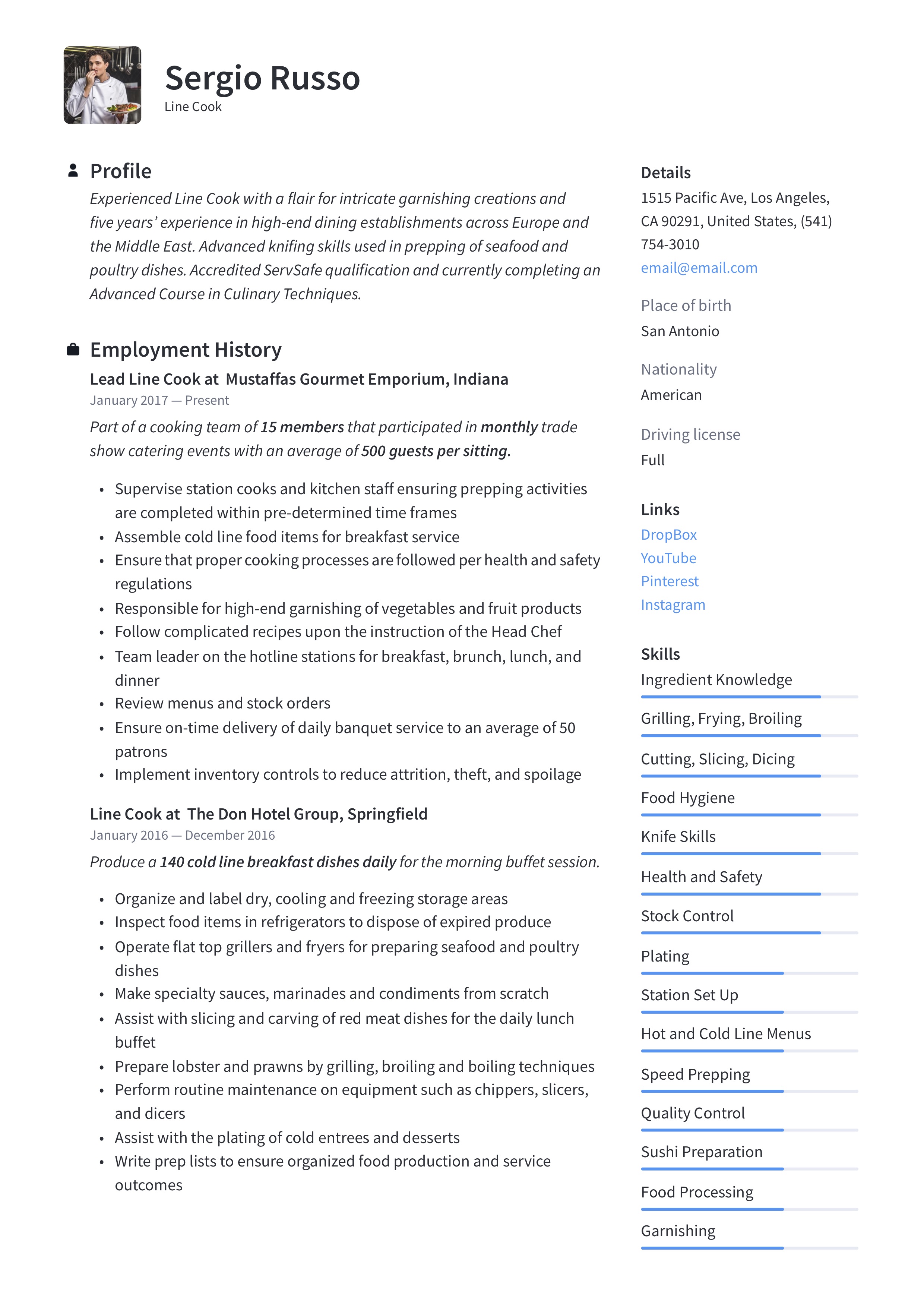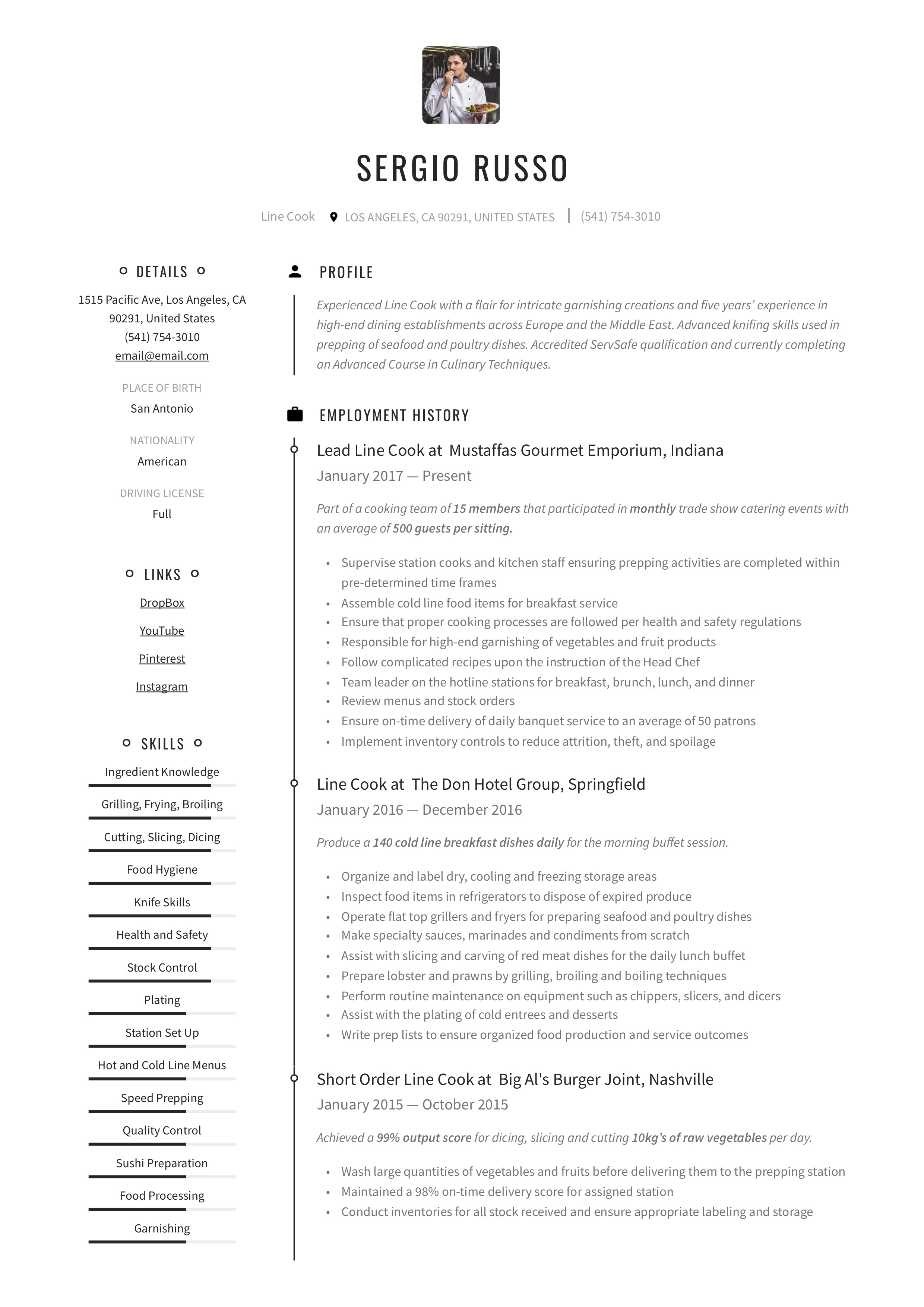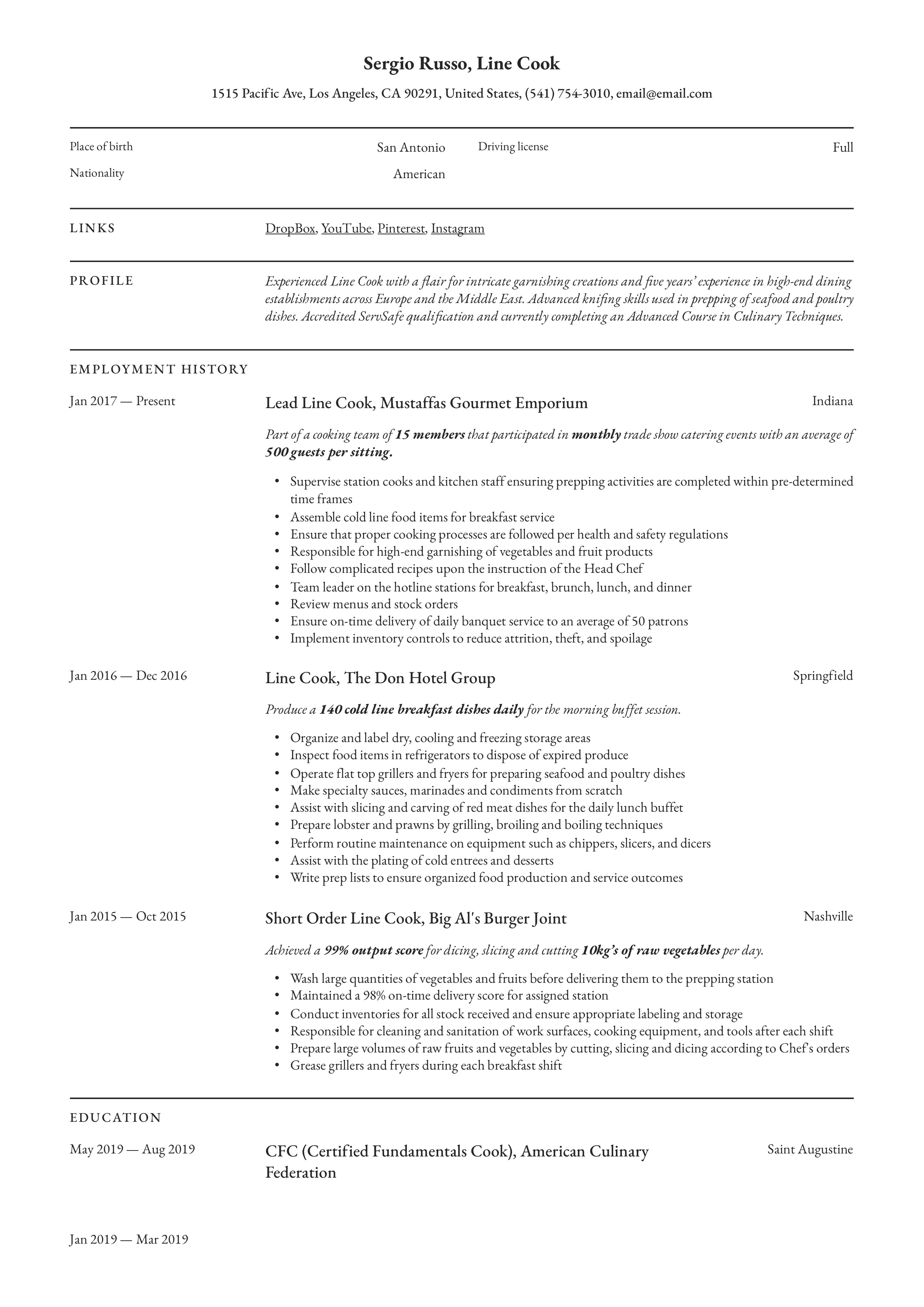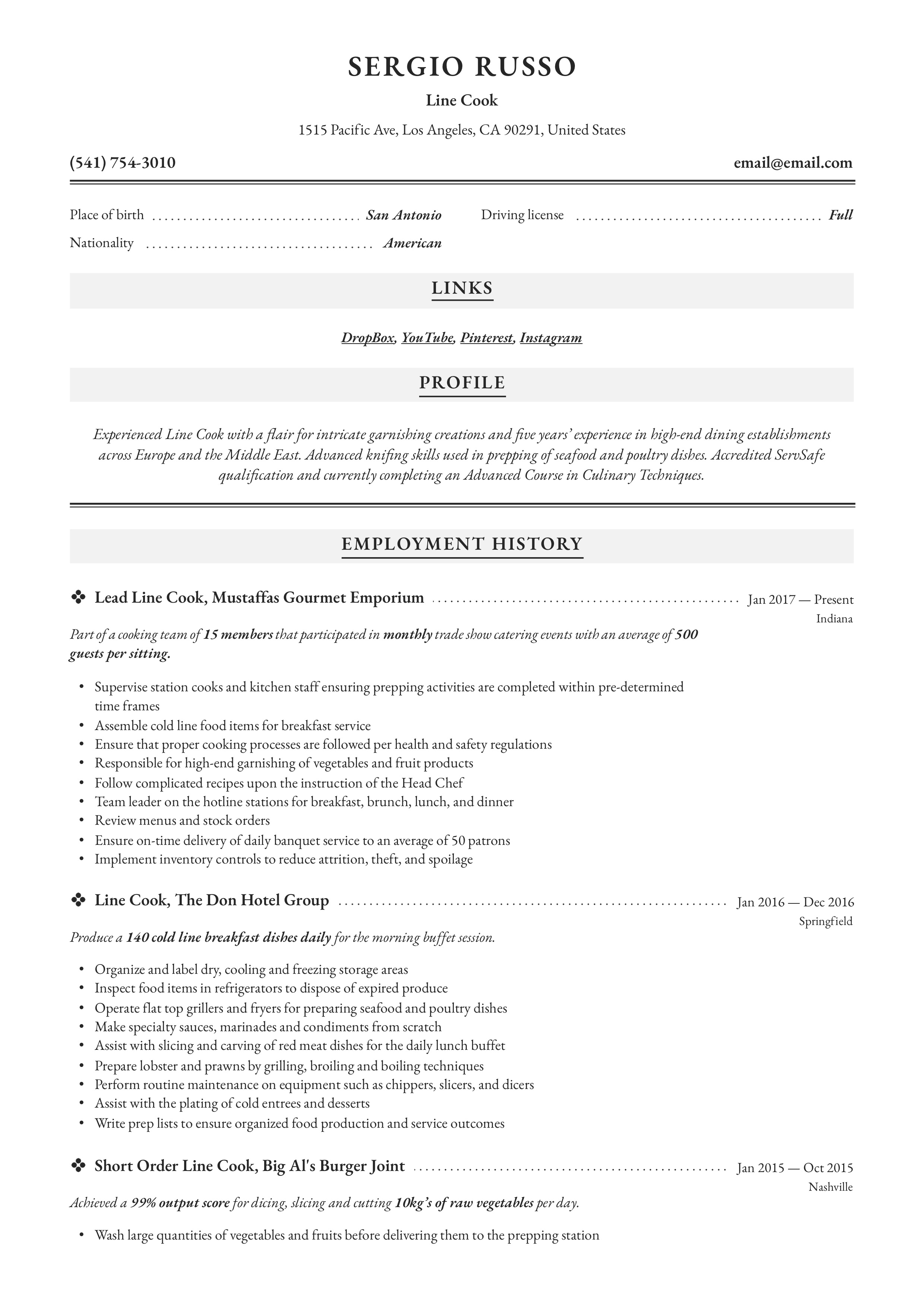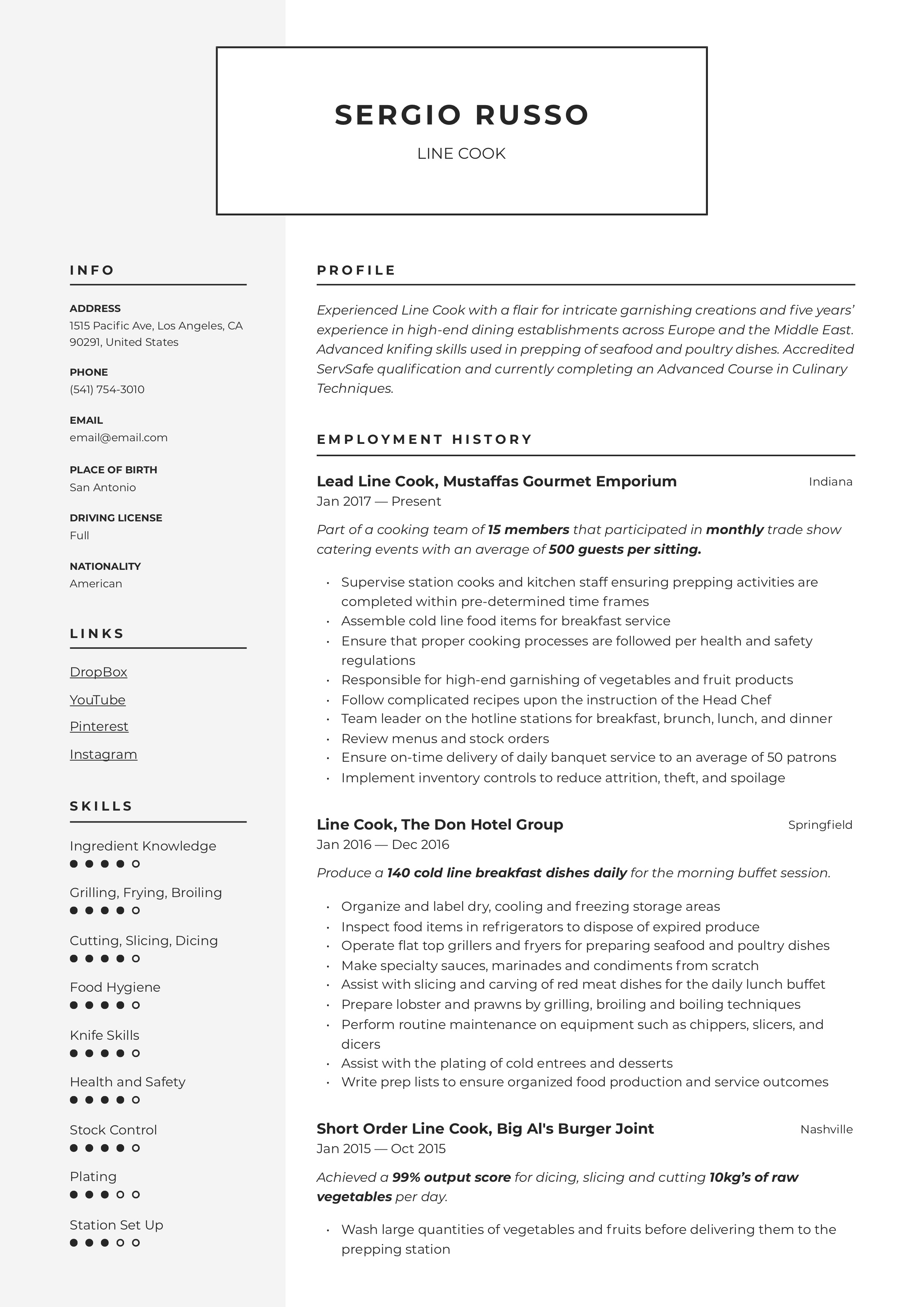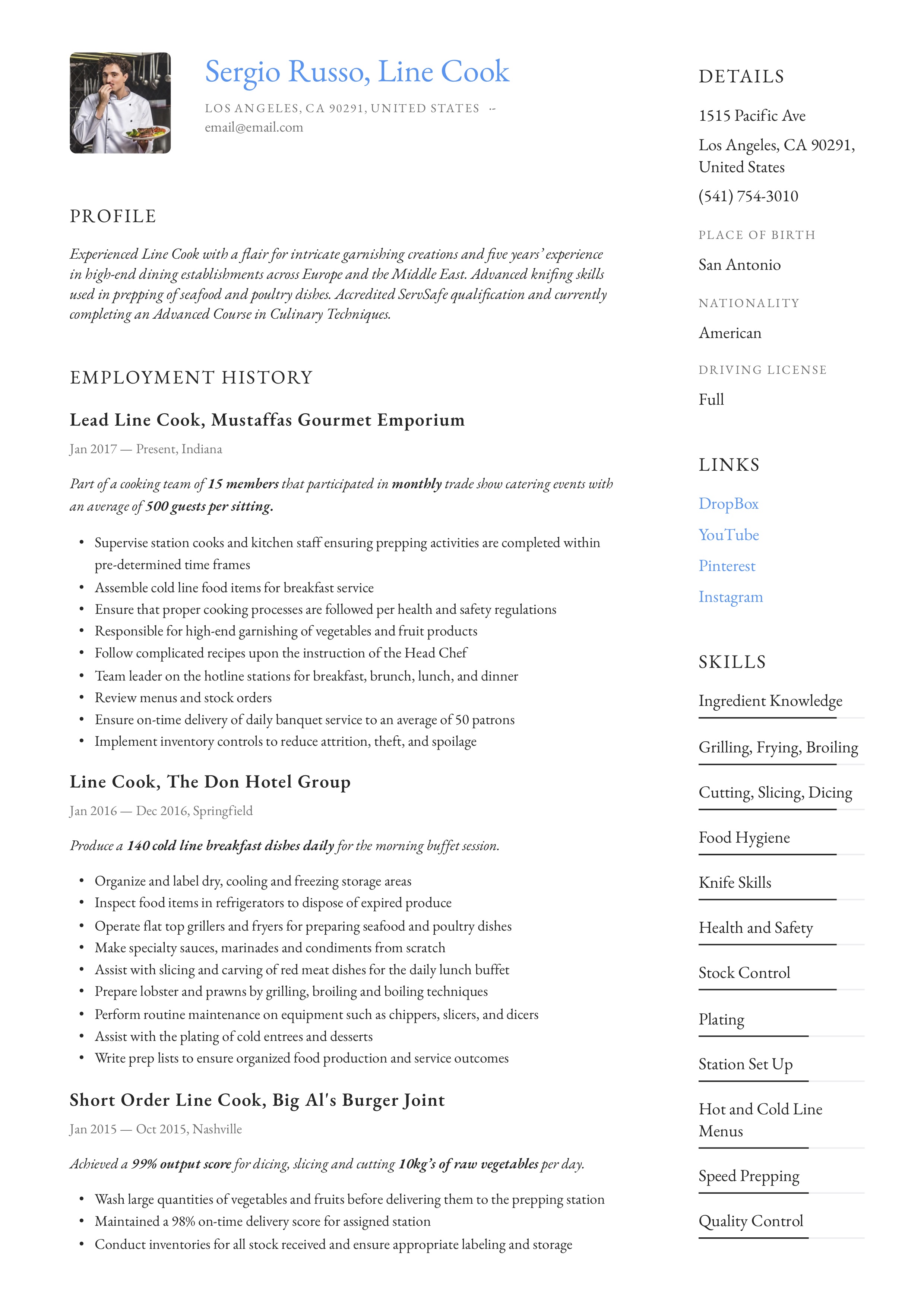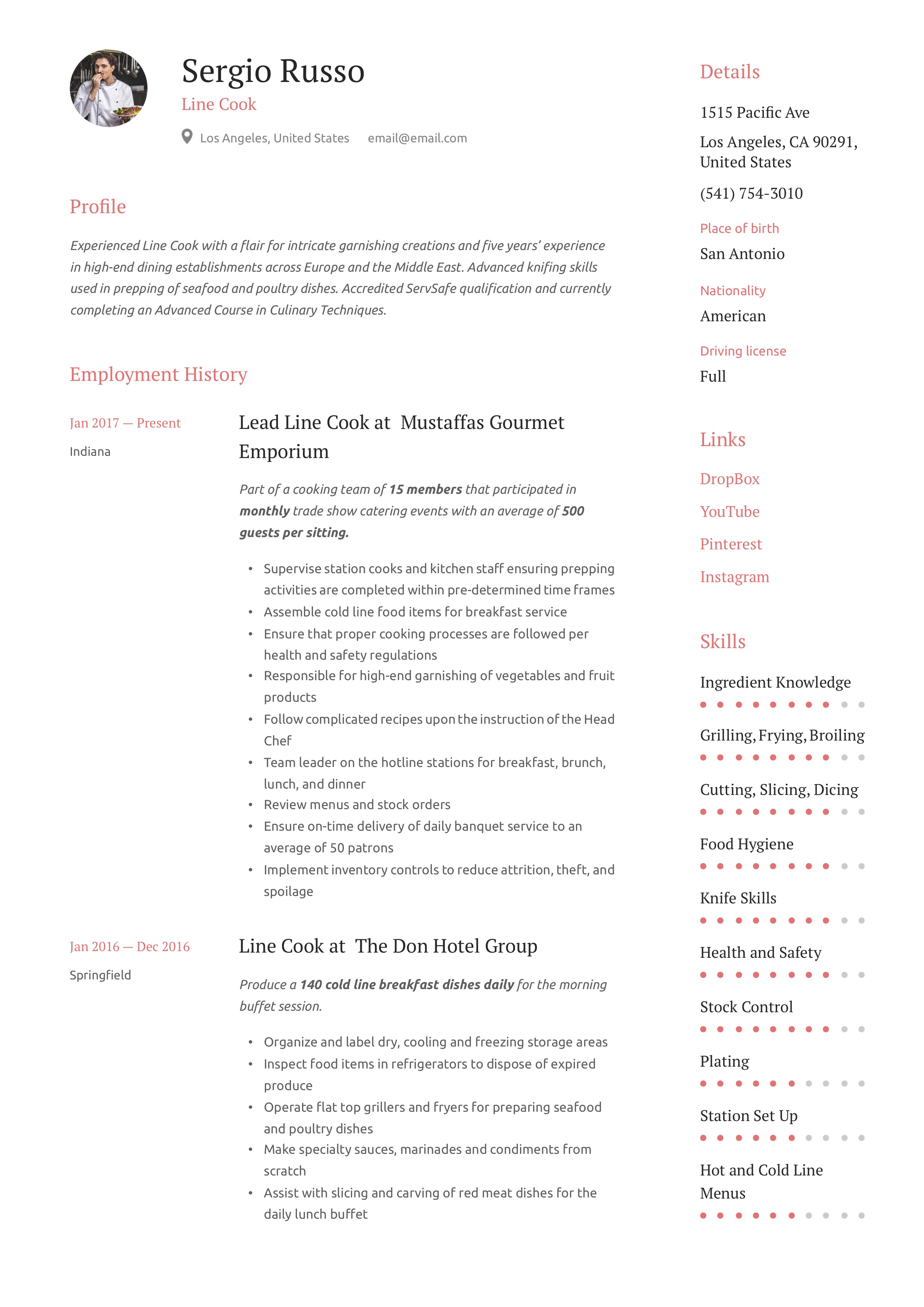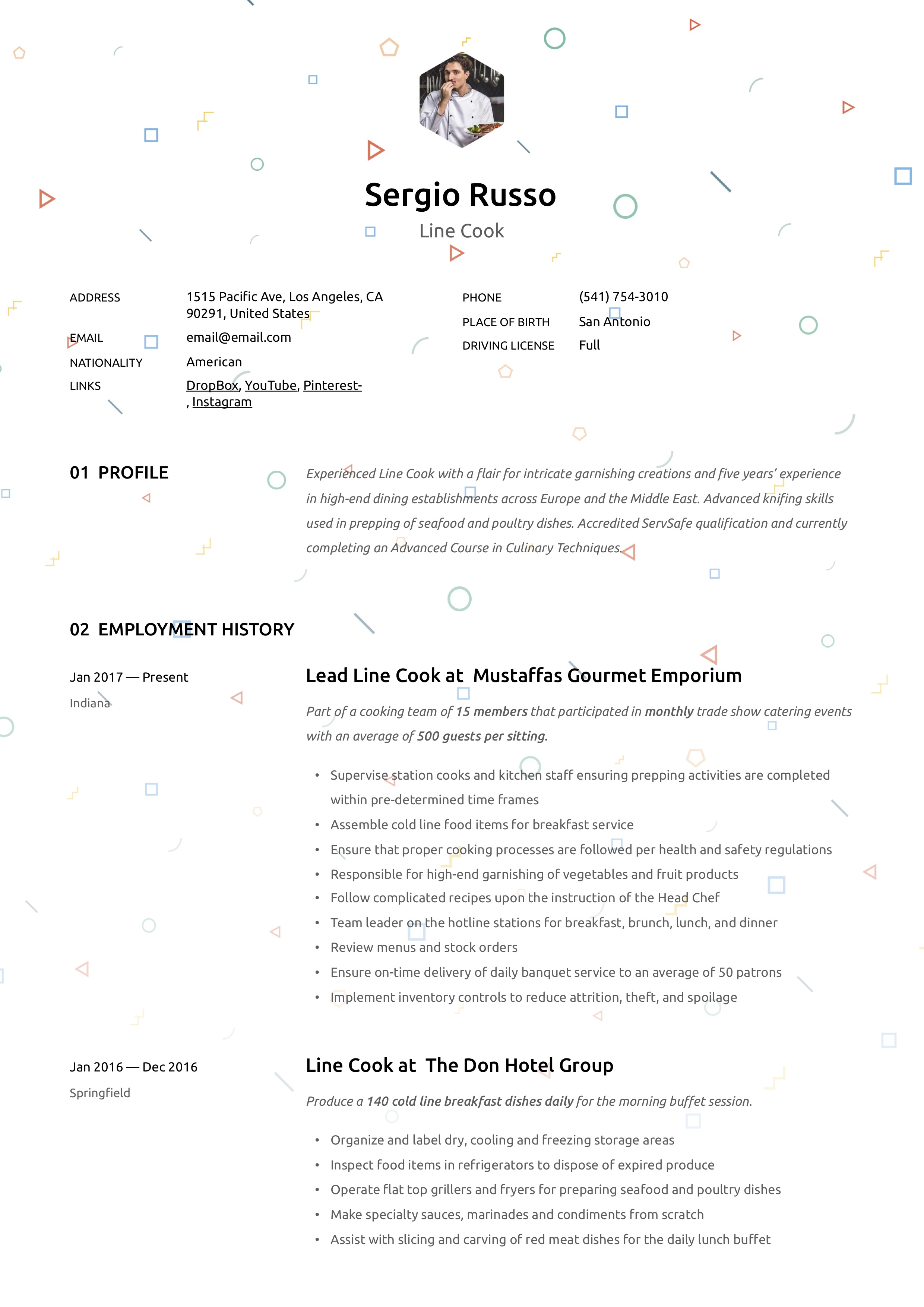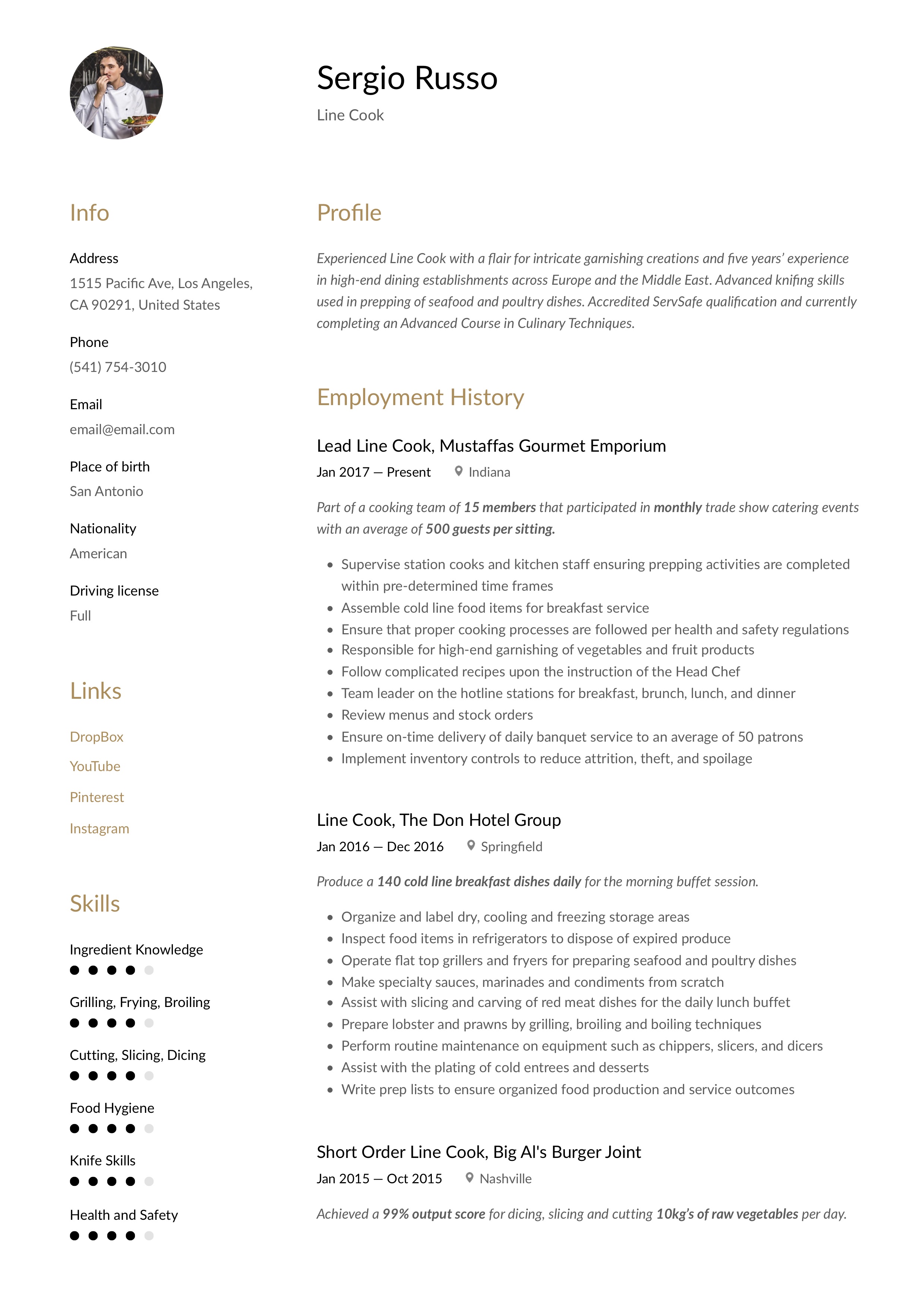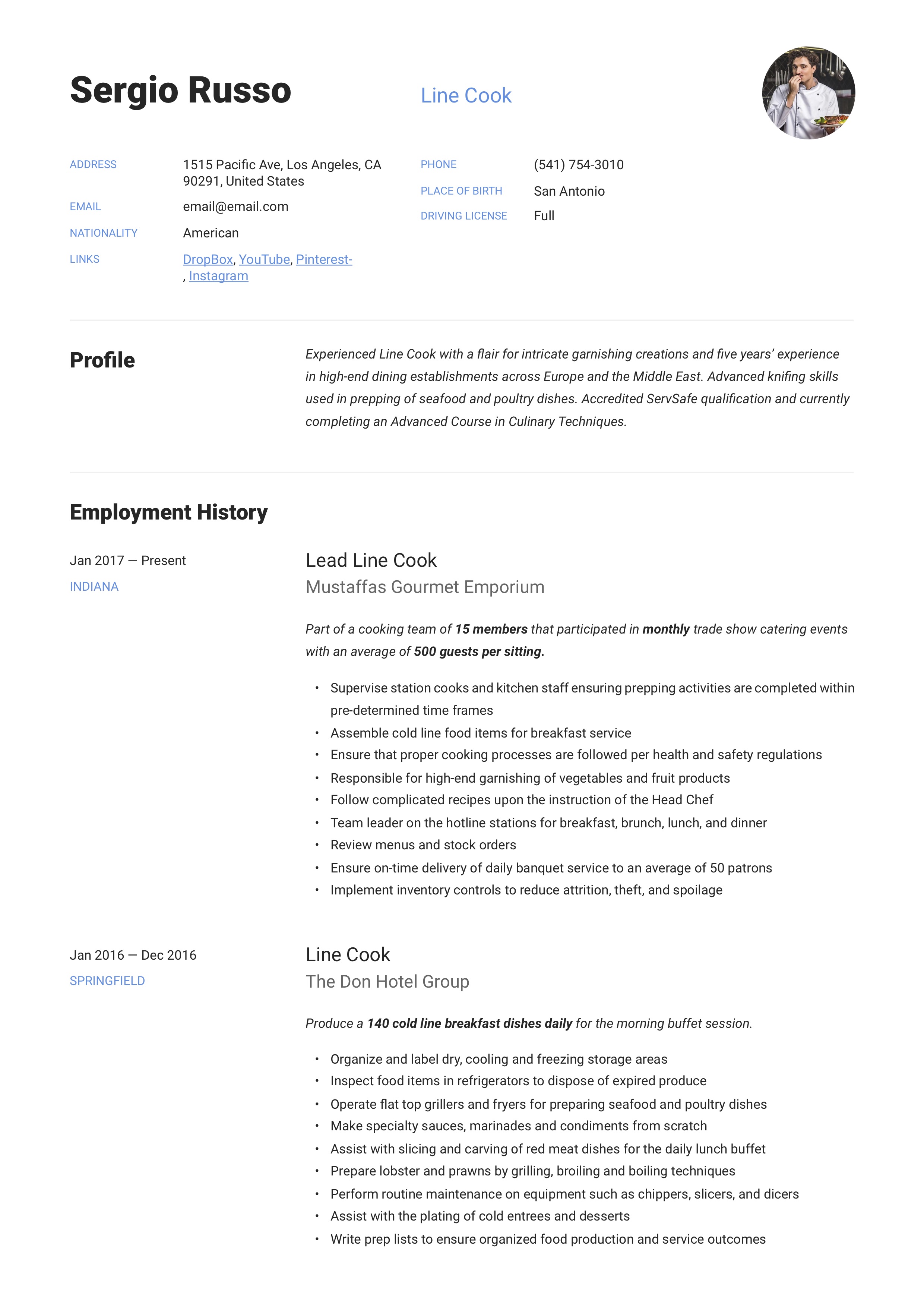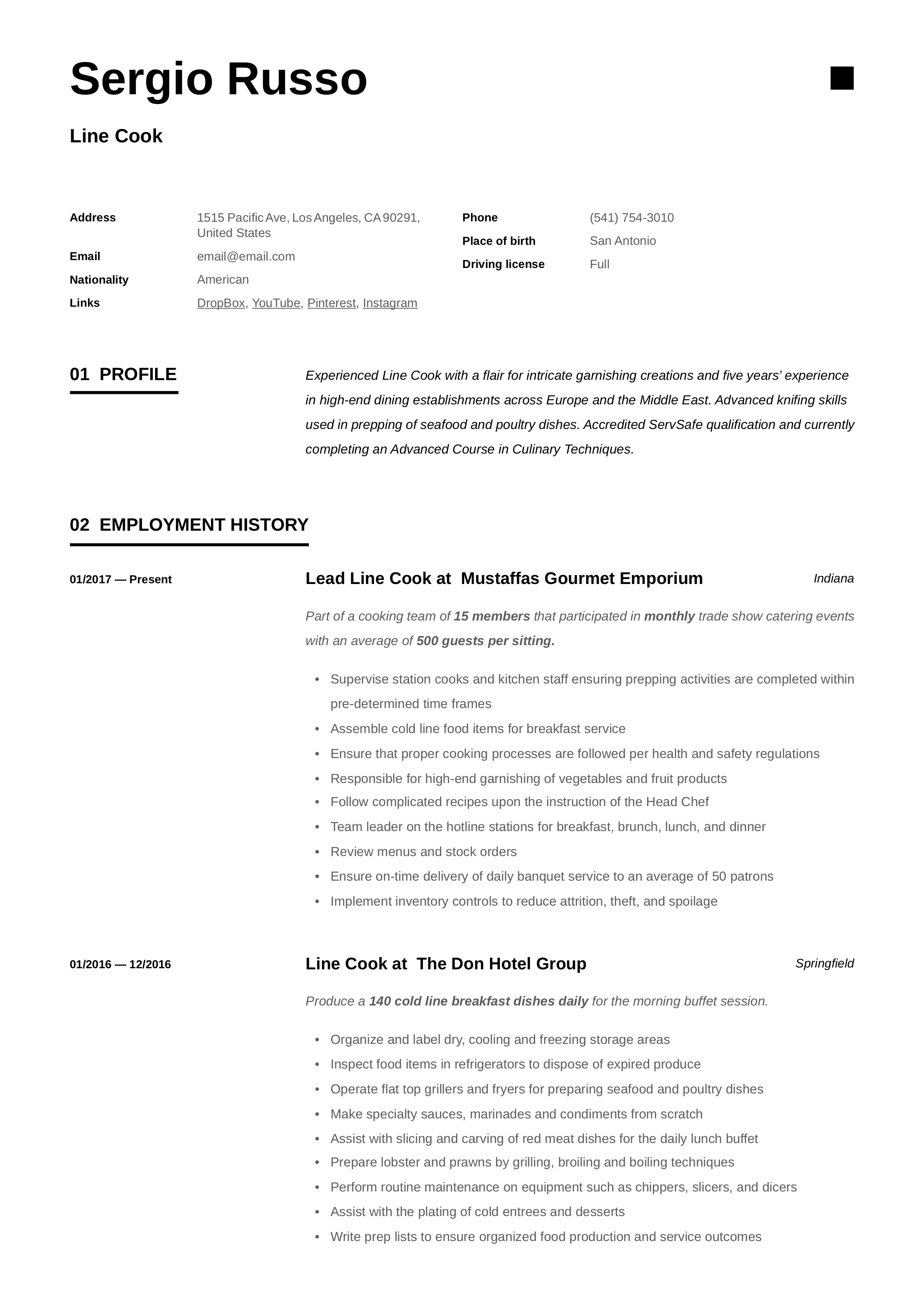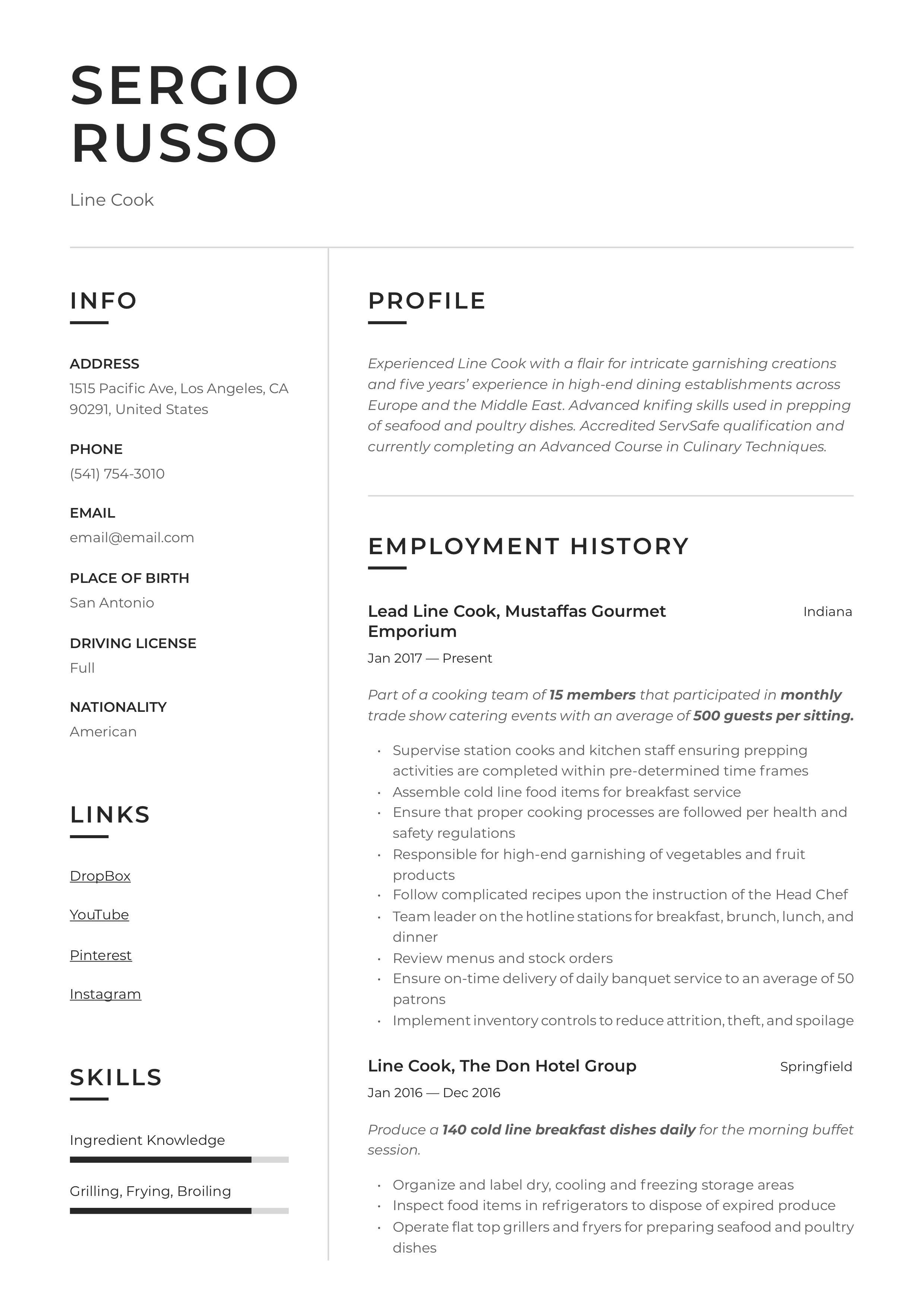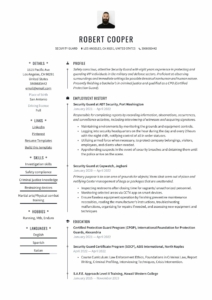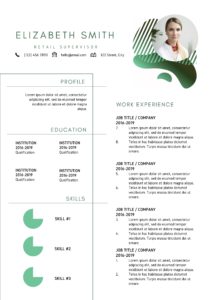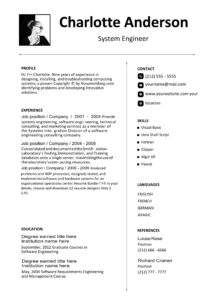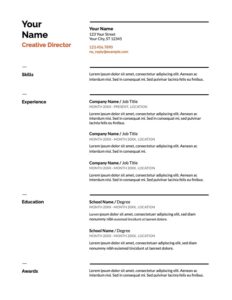Are you looking for a new job as a Line Cook? Then please scroll on further as our Line Cook resume sample and “how to” write-up will assist you in creating a mouth-watering resume that will grab the immediate attention of Head Chefs, Kitchen Managers and Restaurant owners the moment they lay their eyes on your Line Cook application. We have stocked up on advice, guidelines, tricks, and tips to get you started on the exact recipe of drafting a well-structured resume document. No need to start from scratch, follow the steps, and you are halfway to securing an interview for your dream role.
Line Cooks follow a Chef or Kitchen Manager’s specifications to prepare meals that delight customers palates. With this mindset, following the specifications of the Resume Guidelines for Line Cooks below, will also delight those reading your resume by providing informative and compelling information to review.
What you can read in this article
Line Cook Resume Sample
(Free sample downloads are at the bottom of this page)
Line Cook Resume Writing Guide
Resume Sections
1. Contact Information:
Stating the obvious, but this is the headline of your resume and should include your First Name, Last Name, Location, Cell Number, and Email Address. A few points of note: Refrain from using nicknames like Buckie or Cupcake, only include a nickname if your first name is completely unpronounceable to an average person. We all have quirky email addresses at some point; this is not the time for “[email protected]“. Create a professional email address that you may use for all your job applications. Provide alternative contact channels as well, such as your LinkedIn profile or Facebook url details.
2. Career Summary:
The opening statement of your resume is not a half-baked paragraph to just fill up empty white space. An individualized career summary, highlighted in a different font at the top, making an impactful statement to persuade the reader to look at the rest of your document, should be your aim. Limit the career summary paragraph to no more than 4-6 lines.
3. Qualifications Summary:
Qualifications and educational tenure should back up the credentials mentioned in the career summary. View these as the theoretical evidence supporting your technical skills and working experience. Provide concise but accurate details about the certifications and qualifications you have completed with the institution, qualification name, and dates. Don’t forget to include qualifications you are currently completing too.
4. Relevant Cooking Experience:
Some resumes read like memoirs with pages and pages of career history to the very last detail. You have a two-page limit (at most three) therefore one needs to carefully consider what info stays and what info goes. Provide working history of the last ten years and if you are just starting out include in-service training, apprenticeships or part-time and vocational gigs related to the culinary sector. Utilize bullet points to keep the format neat and tidy.
5. Other Employment Experience:
Refer to other experiences unrelated to cooking or the food industry by condensing them into a brief summary mentioning job titles, employment dates, and the primary purpose of those roles. This section is especially important if you are looking for your first job in a culinary setting without formal experience as a Line Cook. It would be best if you elaborated on internships, volunteer work, part-time jobs or casual summer work because employers would like to get an idea of who you are as a person and the skills you may have gained outside of cooking that could be replicated in the job of a Line Cook.
6. Skills Summary/Key Skills:
Skills and competencies are like the benefit tasters in your resume providing hiring managers with surety that you are the most viable hire from the list of applications. The skills section should not merely be a list of “flexible dynamic and hardworking” adjectives to fill up an empty space on the last page of your resume. Use a targeted approach by picking the essential skills from the job ad and mimicking those words and phrases in your skills tables for an extra suitability boost. The skills tables should include a list of 10-15 key competencies that link your technical knowledge and experience to the job description of the role you are applying to.
7. Education/Licenses/Certifications/Relevant Coursework/Training:
As a Line Cook, you may not have specific degrees or diplomas to boast about apart from finishing high school. Take note though that employers also take into account professional development and learning activities such as online courses, workshops, accreditations, and membership certifications. Another plus is that your participation in professional development and training activities shows employers that you are committed to your chosen culinary profession.
What to Highlight in a Line Cook’s Resume
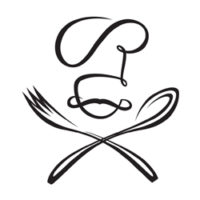
The main purpose of Line Cook’s job is to do prepping and assembling of food items and dishes in accordance with recipe specifications and of course the Head Chef’s orders (that’s probably where the term ‘’Yes Chef’’ originates from).
Regardless of your work experience in restaurants, and other culinary settings there are certain aspects you may want to highlight universally in every application that will grab a recruiter’s attention immediately, even if they are just skimming through your resume in a few seconds.
First and foremost, what type of Line Cook are you?
- Traditional Line Cooks:
These professionals make up most of the Cooks’ numbers in the industry. They work in restaurants (corporate or independent), hotels and hospitality establishments and divided by level of seniority and pay grade with job titles such as Cook#1, Cook#2, Cook#, and so forth. - Short Order Cooks:
They are like the ‘’factory producers’’ of a restaurant, pumping out prepped food items (vegetables, dough, pasta strings) at alarming speeds. The purpose of this role is to prep and assemble simple food items that do not require sophisticated prepping techniques. If you work at a burger joint or breakfast diner, you are most probably a Short Order Cook. - Station Chefs:
The premium level of a Line Cook’s career. These individuals work in high-end restaurants, luxury hotels or specialty culinary establishments and are experts at a specific kitchen station, for instance, sushi, grilling, sautéing or seafood prepping and assembling.
Next, you need to elaborate a bit more regarding your cooking skills – you are applying for a cooking job after all. Mention whether you are an expert on hot or cold food prepping and assembly lines (nope we are still referring to a kitchen environment, not a factory setting). In a breakfast-type diner, your responsibilities may be focused on running the omelet station, or you could be in charge of slicing, deboning, or filleting fish and poultry items before they are placed on the fryers. Be sure to use cooking techniques terminology such as grilling, broiling, frying, sautéing, battering, seasoning breading, and marinating to name but a few.
Preparing various menu side items would be another aspect to draw attention to. Mixing and making specialty sauces or cutting copious amounts of vegetables “julienne style” would be examples of job duties to include as part of your prepping experience.
Equipment and tools would be next on your resume agenda. Skills such as being able to use industrial-sized griddles, large mixing equipment, automatic mixers, specialty knives, and chipping machines should be added in this section of your resume too.
All Line Cooks have to know the ins and outs of setting up a work-station from scratch, specially prepared for the prepping or cooking that needs to take place at that station. One cook’s station may be focused on the grilling of meat and seafood items, while another could be used purely for mixing and prepping various kinds of doughs or your station may be solely used for fancy garnishing items. Be specific about exactly what you do at your station, from set up to shut down and sanitation activities. Each station usually has its own stock items like herbs pre-portioned entrees, cooking utensils, and cleaning tools – this is called a ‘’mise’’ which is French for everything being in its appropriate place before work commences.
Safety, hygiene, and proper sanitation practices can make or break a restaurant when a health inspector or an FDA Safety official arrives for a surprise visit. Cleaning workstations, disinfecting countertops and utensils, washing food items and storing ingredients in appropriate containers, adhering to expiry dates, and also preventing cross-contamination, are crucial parts of a Line Cook’s role in the kitchen.
As a final point, provide more detail on your work setting. Some Line Cooks may work up to 70 hours per week, while others do breakfast or dinner shifts only. It all depends on the nature of the establishment you work for. Line Cooks are employed by many different kinds of establishments for instance diners, hotel venues, specialty restaurants, cruise liner kitchens, military canteens, hospital cafeterias or steakhouses and fast food outlets to name but a few.
*Resume Hack: Now that you have told the reader about your experience as a Line Cook, you can show visual proof by including URLs to your Instagram, Pinterest, or personal website pages. Your portfolio should consist of good-quality pictures and images of the dishes you have made before, or a particular skill with high-end garnishing. You can also use cloud platforms such as Dropbox, Google Drive, or MS One Drive to showcase the food images. Better yet, compile a few short videos of you ‘’in cooking mode’’ and link them to your YouTube Channel for an extra credibility boost.
Line Cook Career Objective
Kitchen Managers and Restaurant Owners receive numerous resumes a month. Your resume objective is the menu taster to persuade them to read the rest of your application. Even though an objective is placed at the top of the resume pages, right under your particulars, this item should be ‘’assembled’’ last, after all the other sections of your resume are completed. Why? The resume objective is an overview of what is written in the rest of your resume and contains your next desired step(s) in your career. Therefore, it should be crafted after you have finalized your resume or cv document.
In a Line Cook’s role, steps, instructions, and specifications are followed to create the perfect dish or prep food items appropriately. Following a similar approach in writing a resume objective would ensure that you stand out from the rest of the cooking crowd’s applications.
- Action 1 – An opening statement relating to your current title, years of experience, and industry setting (spice it up with a powerful adjective).
- Action 2 – List a few technical competencies by picking the most relevant ones from the job spec and relate these phrases to your most essential skills.
- Action 3 – Provide details regarding the highest qualifications, accreditations, or credentials. attained
- The Number One golden rule for resume objectives is the customization of Action
- The technical skills you chose to highlight must resonate with each job spec you apply for (no cookie-cutter recipes valid here).
Golden rule Number Two – keep your statement short and concise, to a maximum of 6 lines.
Examples:
Career Objective 1
Experienced Line Cook with a flair for intricate garnishing creations and five years of experience in high-end dining establishments across Europe and the Middle East. Advanced knifing skills used in prepping of seafood and poultry dishes. Accredited ServSafe qualification and currently completing an Advanced Course in Culinary Techniques.
Career Objective 1
Passionate Line Cook with two years of experience paying meticulous attention to cooking processes being conducted according to FDA as well as Health and Safety Regulations. Expert knowledge in using industrial grillers, fryers, and broilers in a fast-paced family diner environment. Holds a Diploma in Corporate Catering and recently completed the CFC (Certified Fundamentals Cook) accreditation.
Career Objective 1
Energetic Line Cook with six years of experience in bulk food prepping for music festivals, hotel banquets, and dinner services on international cruise liners. Expertise includes the creation of unique sauces and condiments, prepping dough for baked dishes, and overseeing open-fire grilling and frying stations at corporate trade shows. Completed a Bachelor's in Culinary Management and a Diploma in Restaurant Management Techniques.
Line Cook Job Descriptions, Responsibilities, and Duties
An employer would expect to see the following proven foundational duties and skill sets within an applicant’s resume, depending on the educational level and career stage.
Examples
An entry-level stage Line Cook (less than two years experience) may:
- Wash large quantities of vegetables and fruits before delivering them to the prepping station
- Maintained a 98% on-time delivery score for assigned station
- Conduct inventories for all stock received and ensure appropriate labeling and storage
- Responsible for cleaning and sanitation of work surfaces, cooking equipment, and tools after each shift
- Prepare large volumes of raw fruits and vegetables by cutting, slicing, and dicing according to Chef's orders
- Grease grillers and fryers during each breakfast shift
A Prep Line Cook at the mid-career stage (3-4 years experience) may:
- Organize and label dry, cooling, and freezing storage areas
- Inspect food items in refrigerators to dispose of expired produce
- Operate flat-top grillers and fryers for preparing seafood and poultry dishes
- Make specialty sauces, marinades and condiments from scratch
- Assist with slicing and carving of red meat dishes for the daily lunch buffet
- Prepare lobster and prawns by grilling, broiling, and boiling techniques
- Perform routine maintenance on equipment such as chippers, slicers, and dicers
- Assist with the plating of cold entrées and desserts
- Write prep lists to ensure organized food production and service outcomes
A Line Cook at an experienced stage (5+ years experience) may:
- Supervise station cooks and kitchen staff ensuring prepping activities are completed within pre-determined time frames
- Assemble cold line food items for breakfast service
- Ensure that proper cooking processes are followed per health and safety regulations
- Responsible for high-end garnishing of vegetables and fruit products
- Follow complicated recipes upon the instruction of the Head Chef
- Team leader on the hotline stations for breakfast, brunch, lunch, and dinner
- Review menus and stock orders
- Ensure on-time delivery of daily banquet service to an average of 50 patrons
- Implement inventory controls to reduce attrition, theft, and spoilage
Highlight Your Accomplishments
Accomplishments are the garnishes of your resume dish, so keep them related to cooking activities. A Head Chef is unlikely to care about your time as a cashier in the bank (even if you did open more accounts than anyone else!). However, your streamlining of food storage strategies to reduce wastage and attrition will definitely prompt the reader to give our application a second look.
These “eye-catchers” are there for a reason: attract attention, show value, and influence the screening decision to attain an interview invite. It would help if you sprinkled accomplishments throughout the rest of your resume document too (for instance job descriptions and career summary), but allow enough space in your resume to include them in a section of their own.
Time to brag, boast, and promote. Think of things you are most proud of in achieving or were commended for by managers and customers and list them as bulleted statements. Resume quantification is paramount in this section. Facts, figures, numerical values, reviews, ratings, volumes, time frames, and frequencies should be incorporated into your accomplishment statements to boost your suitability score for the role.
*Resume Hack: Highlight and bold the values, results, and numbers in your accomplishment statements.
Examples:
- Produce 140 cold-line breakfast dishes daily for the morning buffet session
- Achieved a 99% output score for dicing, slicing, and cutting 10 kg’s of raw vegetables per day
- Reorganized workflow processes between prepping and grilling stations resulting in reducing meal processing time by 25%
- Part of a cooking team of 15 members that participated in monthly trade show catering events with an average of 500 guests per sitting
- Streamlined dessert assembly procedures which decreased plating time to under 60 seconds from a previous 2 minutes
Line Cook Education Section
There is no such thing as an overdone education section, the more credentials, the better. However, you may feel like your education tenure is a bit underdone because you don’t have a prestigious degree or completed culinary school at some posh French establishment.
No need for despair: courses, webinars, self-study, practical workshops, and online certifications are just as relevant to your overall learning and development. Educational history should include the name of your qualification (degree, accreditation, course, training program), institution, and date of completion.
Examples:
2018 – CFC (Certified Fundamentals Cook), American Culinary Federation, Saint Augustine, FL
2018 – Certified Fundamentals Pastry Cook (CFPC), Culinary Institute of America, Hyde Park, NY
2018 – Certified Culinarian (CC), American Culinary Federation, Saint Augustine, FL
2018 – ServSafe Certified, Udemy, Online
2017 – Course in Classic Cooking Principles, Escoffier, Online
2016 – Course in Seasonings and Spices, Escoffier Online
2012-2013 – Associate’s Degree in Culinary Arts, Keuka College, Keuka Park, NY
Curriculum: Fundamentals, Professionalism, Gastronomy, Measuring, Production Methods
Line Cook Resume Skills
Stating the most obvious, of course, you need technical cooking skills to apply for a Line Cook role. Apart from your “je ne sais quois” in prepping, cooking and dish assembly, Kitchen Managers are also looking for Cooks who can take direction, produce required output, work well within a team, and handle the pressure cooker environment of a busy kitchen without having a meltdown. These attributes are referred to as interpersonal or soft skills. A combination of the required technical competencies and personal traits is needed to indicate your fit as a potential employee.
Taking the ‘’ingredients list’’ approach and typing skills and attributes one after the other in bullet point format is certainly not wrong, but oh so incredibly dull and unimaginative. Turn up the heat and provide recruiters with skills tables, one for technical skills and one for personal skills and as a bonus a tools and equipment table as well.
Line Cook Technical Skills
| Stock Control | Plating | Volume Conversions | A La Carte Prepping |
| Knife Skills | Hot Lines | Metric | Buffet Prepping |
| Order Management | Cold Lines | Food Components | Entrees |
| Safety Regulations | Quality Control | Recipes | Desserts |
| Food Hygiene | Speed Prepping | Menus | Deboning |
| Ingredient Knowledge | Station Set-Up | Food Processing | Filleting |
| Grilling, Frying, Broiling | Discerning Palate | Complex Garnishing | Dough Prepping |
| Cutting, Slicing, Dicing | Sushi Preparation | Sauces and Marinade Preparation | Halaal and Kosher Techniques |
Interpersonal Skills
| Social Orientation | Stamina | Verbal Reasoning | Collaborative |
| Team Player | Dexterity | Cooperative | Customer Service |
| Reliable | Energetic | Numerical Adeptness | Time Management |
| Punctual | Enthusiastic | Written Comprehension | Organized |
| Independent | Personal Hygiene | Active Listener | Adaptable |
| Task Orientated | Nimble | Tasting Sense | Focussed |
| Accurate | Deadline Driven | Smelling Sense | Calm |
| Multi-Tasking | Meticulous | Diplomatic | Diligent |
Tools & Equipment
| Chef's Knife | Food Processors | Tilt Skillets | Mesh Strainer |
| Y-Shaped Peeler | Rotary choppers | Fryers | Kitchen Tongs |
| Mandolin | Flat-top Griddle | Electric Slicing Machines | Broiler |
| Fish Spatula | Zesters | Steam-jacketed Kettles | Convection Oven |
| Colander | Graters | Bamboo Tools | Salamander |
| Potato Ricer | Whisks | Pounders | Boning Knives |
| Meat Thermometer | Bench Scrapers | Marinade Equipment | Paring Knives |
| Spice Grinder | Planetary Mixer | Spiral Mixer | Gas Oven |
Qualifications/Certifications associated with Line Cooks
| Young Apprenticeship in Hospitality | Certificate in Food Hygiene | Certified Culinarian (CC) |
| Diploma Catering and Gourmet Cooking | Certificate in Safety and Sanitation Nutrition | Certified Kitchen Cook (CKC) |
| Bachelor in Culinary Arts | Professional Line Cook Certificate | Business Management, Hospitality & Tourism Certificate |
| Project Management Diploma | Baking and Pastry Specialist Certificate | Diploma in Pastry Arts |
Action Verbs for your Line Cook Resume
| Portioning | Plating | Making |
| Checking | Problem Solving | Improving |
| Organizing | Preparing | Cleaning |
| Measuring | Garnishing | Preparing |
| Creating | Listening | Prioritizing |
Professional information on Line Cooks
Sectors: Food & Beverage, Hospitality, Events, Tourism, Government, Education
Career Type: Cooking, Catering, Culinary
Person type: Worker, Assistant, Helper, Plater, Preparer
Education levels: From High School Diploma to Bachelor’s Degree
Salary indication: $21,034 to $30,004 per annum
Labor market: Subject to 2% decline from 2016 – 2026
Organizations: Hospitals, Restaurants, Pubs, Hotels, Catering Venues, Holiday Resorts, Fast Food Establishments, Schools, Military Establishments
Download Line Cook Resume Examples in PDF
Or make all these resumes yourself with the resume builder, found by clicking our blue buttons!
